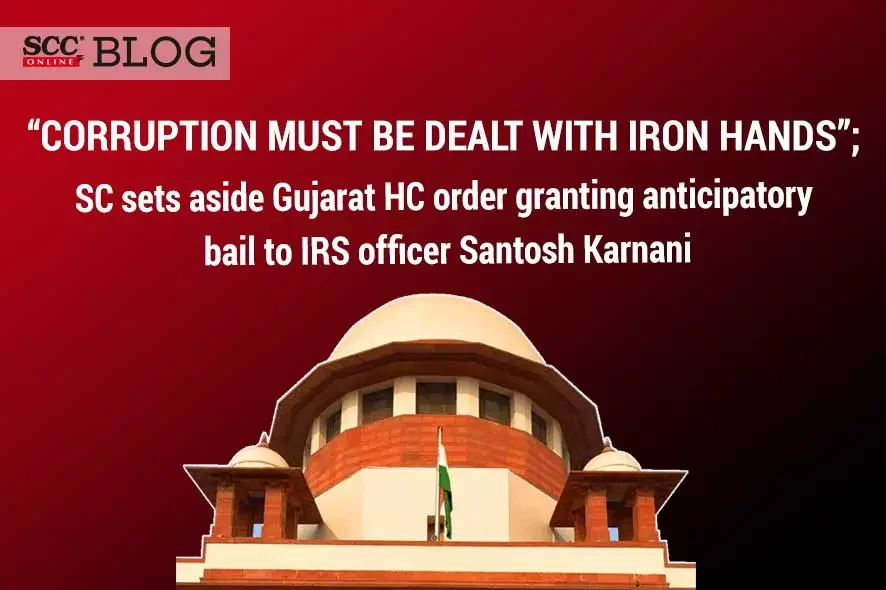Supreme Court: In a set of criminal appeals, against the order of Gujarat High Court, wherein the respondent’s application for anticipatory bail was allowed for offences under Section 7 of the Prevention of Corruption Act, 1988, the Division Bench of Surya Kant* and J.K. Maheshwari, JJ., allowed the appeals and set aside the impugned order of the High Court and said that the Courts must draw a delicate balance between liberty of an individual as guaranteed under Article 21 of the Constitution of India and the need for a fair and free investigation, which must be taken to its logical conclusion.
Background
In the matter at hand, the complainant is a businessman engaged in the construction business. In February 2019, the respondent, an Indian Revenue Service Officer (‘IRS’), posted as Additional Commissioner of Income Tax, Ahmedabad, conducted a survey for the financial year 2018-19 under Section 133-A of the Income Tax Act, 1961 against the complainant’s business, whereunder the group disclosed an additional income of Rs. 50 crores.
Thereafter, in September 2021, search and seizure action was initiated by the Income Tax Department, Ahmedabad and some papers related to the complainant’s business were seized. Subsequently, the complainant and the Respondent met frequently in connection with the case, and it is alleged that during these interactions the respondent had threatened to ruin the complainant’s business and demanded illegal gratification.
Accordingly, an illegal gratification of Rs. 30 lakhs were demanded by the respondent to help the complainant with his case. The complainant had recorded this conversation and handed it over to the investigating authorities. The Complainant was directed to deposit the amount in the account of X person, who happens to be owner of a firm. Thus, FIR was registered against the respondent under Sections 7, 13(1) and 13(2) of the Prevention of Corruption Act, 1988 (‘the Act’) on 04-10-2022. Considering the gravity of the case, the case was transferred to the Central Bureau of Investigation (‘CBI’) and FIR was re-registered on 12-10-2022 for offences under Section 7 of the Act. Several notices were issued to the respondent under Section 41 A for appearances before the CBI, to which the respondent sought more time to appear before the Investigating Officer. The Respondent had simultaneously preferred an application for grant of anticipatory bail before the Sessions Court, Ahmedabad, which was rejected. Meanwhile, the Court of Special CBI judge issued a non-bailable warrant against the respondent, and aggrieved by the same order, the respondent applied for anticipatory bail before the Gujarat High Court. The High Court granted anticipatory bail to the respondent, which forms the impugned order.
Analysis, Decision
The Court said that the time-tested principles are that no straitjacket formula can be applied for grant or refusal of anticipatory bail, the Courts must draw a delicate balance between liberty of an individual as guaranteed under Article 21 of Constitution of India and the need for a fair and free investigation, which must be taken to its logical conclusion.
The Court noted that the High Court fell in a factual error in observing that the FIR was registered on 12-10-2022, whereas the FIR against the respondent was originally registered on 04-10-2022, and considering the gravity of the offences, the case was transferred to CBI and FIR was re-registered on 12-10-2022.
Further, the Court noted that the manner in which the respondent evaded his arrest with the help of his colleagues and got the evidence destroyed, is a strong circumstance to indicate his complicity. The nature and gravity of the alleged offence should have been kept in mind by the High Court.
The Court referred to the materials placed on record by the CBI and said that it seems that prima facie, the allegations against the respondent cannot be brushed aside lightly. Also, there appears to be a well-organised syndicate comprising officials of Income Tax Department, businessmen and hawala traders, who are in tandem, and such a nexus needs to be unearthed through an unimpaired and unobstructed investigation.
Further, the Court said that the first proviso to Section 17-A of the Act refers to the cases wherein a public servant is charged with acceptance of an undue advantage or attempt thereof. If prior approval or sanction to investigate such an officer through a trap is sought, it is likely to defeat the very purpose of the trap and the investigation, which is not the underlying intention of the legislature. Also, the investigation against the respondent, being accused of demanding bribe, did not require any prior approval of the Central Government.
Thus, the Court viewed that, considering the nature of allegations, material on record and the settled legal principles on grant of anticipatory bail, the High Court ought to have refrained itself from extending protection against arrest to the respondent in exercise of its discretionary jurisdiction under Section 438 of the Code of Criminal Procedure.
Therefore, the Court allowed the appeals and set aside the impugned judgment and order of grant of anticipatory bail to the respondent. The Court also quashed the remand order against the respondent passed by the Special Judge, CBI Court on 30-12-2022.
[Central Bureau of Investigation v. Santosh Karnani, 2023 SCC OnLine SC 427, Judgment Dated: 17-04-2023]
*Judgment Authored by: Justice Surya Kant
Appearances:
For Petitioners:
SLP(Crl.)No. 295/23
Solicitor General Tushar Mehta; Advocate Rajat Nair; Advocate Amit Sharma B; Advocate A K Kaul; Advocate Madhav Sinhal; Advocate Pratyush Shrivastava; Advocate Anandh Venkataramani; Mrs. Vijayalakshmi Venkataramani; Advocate Vinayak Mehrotra.
In SLP(Crl.)No. 724/23 :
Advocate Maninder Singh; Advocate Siddharth Dharmadhikari; Advocate Abhikalp Pratap Singh, AOR; Advocate Prabhas Bajaj; Advocate. Shreya Saxena; Advocate Mansi Sood; Advocate Chitvan Singhal; Advocate Sonali Jain; Mr. Advocate Abhishek Kumar Pandey; Advocate Raman Yadav; Advocate Arvind Kumar Sharma, AOR
For Respondent(s)
Senior Advocate Mukul Rohatgi; Senior Advocate Narender Hooda; Senior Advocate Shyam Divan; Diksha Rai, AOR; Advocate Bhadrish S. Raju; Advocate Alok Sangwan; Advocate Sumit Kumar Sharma; Advocate Shaurya Lamba; Advocate Uday Aditya Banerjee; Advocate Ankit Agarwal; Advocate Prateek Dhankhar.






